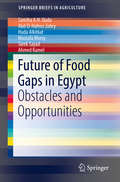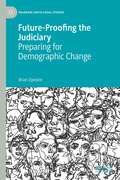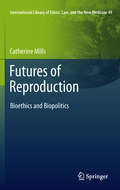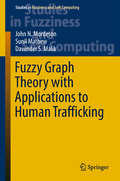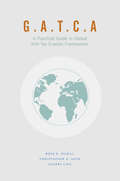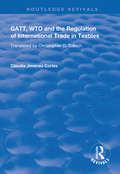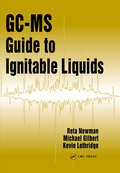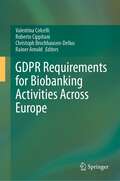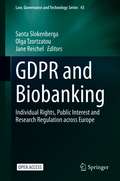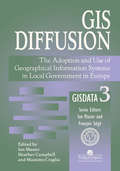- Table View
- List View
Future of Food Gaps in Egypt
by Abd El-Hafeez Zohry Samiha A. H. Ouda Huda Alkitkat Mostafa Morsy Tarek Sayad Ahmed KamelThis work gives a multidisciplinary approach to assess and provide solutions to improve food security in Egypt. It has specific chapters on projection of climate change using IPCC AR5 models and regional climate model, and a chapter on population projection in 2030. This book aimed at research, graduate/post graduate students and policy makers. It can also be used by overpopulated countries to solve their own food gap problems.
Future-Proofing the Judiciary: Preparing for Demographic Change (Palgrave Socio-Legal Studies)
by Brian OpeskinThis book reinvigorates the field of socio-legal inquiry examining the relationship between law and demography. Originally conceived as 'population law' in the 1960s following a growth in population and a use of law to temper population growth, this book takes a new approach by examining how population change can affect the legal system, rather than the converse. It analyses the impact of demographic change on the judicial system, with a geographic focus on Australian courts but with global insights and it raises questions about institutional structures. Through four case studies, it examines how demographic change impacts on the judicial system and how should the judicial system adapt to embody a greater preparedness for the demographic changes that lie ahead? It makes recommendations for reform and speaks to applied demographers, socio-legal scholars, and those interested in judicial institutions.
Futures of International Criminal Justice (Routledge Socio-Legal Frontiers of Transitional Justice)
by Martin Clark Emma Palmer Edwin Bikundo Susan Harris RimmerThis collection identifies and discusses problems and opportunities for the theory and practice of international criminal justice. The International Criminal Court and project of prosecuting international atrocity crimes have faced multiple challenges and critiques. In recent times, these have included changes in technology, the conduct of armed conflict, the environment, and geopolitics. The mostly emerging contributors to this collection draw on diverse socio-legal research frameworks to discuss proposals for the futures of international criminal justice. These include addressing accountability gaps and under-examined or emerging areas of criminality at, but also beyond, the International Criminal Court, especially related to technology and the environment. The book discusses the tensions between universalism and localisation, as well as the regionalisation of international criminal justice and how these approaches might adapt to dynamic organisational, political and social structures, at the ICC and beyond. The book will be of interest to students, researchers and academics. It will also be a useful resource for civil society representatives including justice advocates, diplomats and other government officials and policy-makers.
Futures of Reproduction
by Catherine MillsIssues in reproductive ethics, such as the capacity of parents to 'choose children', present challenges to philosophical ideas of freedom, responsibility and harm. This book responds to these challenges by proposing a new framework for thinking about the ethics of reproduction that emphasizes the ways that social norms affect decisions about who is born. The book provides clear and thorough discussions of some of the dominant problems in reproductive ethics - human enhancement and the notion of the normal, reproductive liberty and procreative beneficence, the principle of harm and discrimination against disability - while also proposing new ways of addressing these. The author draws upon the work of Michel Foucault, especially his discussions of biopolitics and norms, and later work on ethics, alongside feminist theorists of embodiment to argue for a new bioethics that is responsive to social norms, human vulnerability and the relational context of freedom and responsibility. This is done through compelling discussions of new technologies and practices, including the debate on liberal eugenics and human enhancement, the deliberate selection of disabilities, PGD and obstetric ultrasound.
Futures of Reproduction: Bioethics and Biopolitics
by Catherine MillsIssues in reproductive ethics, such as the capacity of parents to 'choose children', present challenges to philosophical ideas of freedom, responsibility and harm. This book responds to these challenges by proposing a new framework for thinking about the ethics of reproduction that emphasizes the ways that social norms affect decisions about who is born. The book provides clear and thorough discussions of some of the dominant problems in reproductive ethics - human enhancement and the notion of the normal, reproductive liberty and procreative beneficence, the principle of harm and discrimination against disability - while also proposing new ways of addressing these. The author draws upon the work of Michel Foucault, especially his discussions of biopolitics and norms, and later work on ethics, alongside feminist theorists of embodiment to argue for a new bioethics that is responsive to social norms, human vulnerability and the relational context of freedom and responsibility. This is done through compelling discussions of new technologies and practices, including the debate on liberal eugenics and human enhancement, the deliberate selection of disabilities, PGD and obstetric ultrasound.
Futurisks: Risk Management in the Digital Age (Accounting, Finance, Sustainability, Governance & Fraud: Theory and Application)
by Halis Kıral Gökhan YılmazThis book explores the profound impact of digital transformation on enterprise risk management. It highlights the shifting dynamics of supply and demand influenced by technological advancements, evolving customer preferences, geopolitical tensions, and regulatory developments. Beyond building digital infrastructure, digital transformation requires organizations to rethink strategic decisions, business processes, and the legal and ethical frameworks governing operations. The book identifies critical risk areas amplified by digital transformation, including cybersecurity, data privacy, compliance, labor, third-party dependencies, business continuity, environmental sustainability, and regulatory challenges. The book underscores the need for organizations to move beyond superficial digital updates and adopt transformative approaches to business models, processes, and structures. It offers actionable strategies for leaders to navigate the complexities of rapid technological change and turn emerging risks into opportunities.
Futurizing Intellectual Capital: Insights on Navigating Knowledge-Based Value Creation (Knowledge Management and Organizational Learning #15)
by Aino Kianto Slađana Čabrilo Lina UžienėThis book collects the ground-breaking ideas of top IC scholars on how to futurize IC theory and practice. Keeping the future in focus and searching for answers to fundamental questions related to the development of IC theory and practice that foster sustainability and societal wellbeing, this book provides new insights and perspectives concerning the nature and scope of IC, its effective management mechanisms, and the potential impact of IC on organizations and societies. The carefully curated 16 chapters by leading thinkers in the field address the key areas of future-proof IC research and practice: the complex and dynamic nature of IC, the role of IC in social ecosystems and its potential in facilitating smart social growth, the dynamic interplay between artificial intelligence and IC, and alternative paradigms for optimizing the transformative power of IC while prioritizing sustainability, social equity, and holistic wellbeing. The book inspires new thinking by breaking old thought patterns, making new connections, and generating fresh perspectives on IC. Serving as a catalyst for future global dialogue, the book guides scholars and practitioners on how to align IC theory and practices with future economic, social, and technological changes, inspires experimentation, and opens up new perspectives for the development of IC theory and practice that should contribute to the global societal transformation, sustainable growth, and peace.
Fuzzy Graph Theory with Applications to Human Trafficking (Studies in Fuzziness and Soft Computing #365)
by John N. Mordeson Sunil Mathew Davender S. MalikThis book reports on advanced concepts in fuzzy graph theory, showing a set of tools that can be successfully applied to understanding and modeling illegal human trafficking. Building on the previous book on fuzzy graph by the same authors, which set the fundamentals for readers to understand this developing field of research, this second book gives a special emphasis to applications of the theory. For this, authors introduce new concepts, such as intuitionistic fuzzy graphs, the concept of independence and domination in fuzzy graphs, as well as directed fuzzy networks, incidence graphs and many more.
Fußballgroßveranstaltungen im Spannungsverhältnis zwischen Freiheit und Sicherheit: Eine wissenschaftliche Untersuchung zur Bedeutung von Kommunikation und Dialog
by Dieter Kugelmann Thomas KuberaDas Buch präsentiert die wissenschaftlichen Ergebnisse des interdisziplinären Forschungsprojektes „Mehr Sicherheit im Fußball – Verbessern der Kommunikationsstrukturen und Optimieren des Fandialogs“. Die aus dem vom Bundesministerium für Bildung und Forschung geförderten Projekt hervorgehenden Erkenntnisse zum Status Quo der Sicherheitsgewährleistung bei Fußballgroßveranstaltungen bieten eine Reihe von Ansätzen zur Verbesserung von Kommunikationsstrukturen und -prozessen. Sie basieren auf Untersuchungen an 25 Vereinsstandorten der ersten drei Profiligen. Das Feld wurde durch Interviews mit Experten aus Fanarbeit, Fanszenen, Polizeibehörden, Vereinen und Kommunen und durch Befragungen von Stadionbesuchern, Fangruppierungen, Reisenden im Fanreiseverkehr und der Bevölkerung erschlossen. Weiterhin wurden rechtliche Stellungnahmen und Empfehlungen erarbeitet sowie eine technische Kommunikationsplattform beforscht, die eine effektive Zusammenarbeit der verschiedenen Akteure ermöglichen soll.
Fußspuren von Feist in der europäischen Datenbankrichtlinie: Eine rechtliche Analyse der Gesetzgebung zum geistigen Eigentum in Europa
by Indranath GuptaIm Zusammenhang mit der Rechtsprechung zur Urheberrechtsfähigkeit einer Tatsachenzusammenstellung werden in diesem Buch die Fußspuren des in einer Entscheidung des Obersten Gerichtshofs der USA (Feist) vorgesehenen Standards in Europa ausfindig gemacht. Insbesondere wird untersucht, inwieweit diese Rechtsprechung mit dem in der Europäischen Union angenommenen und diskutierten Standard übereinstimmt. Oftmals bleiben die Gründe für die Rechtsetzung unbemerkt. Die zwingenden Umstände und die Geschichte, die dem Erlass eines Gesetzes vorausgehen, helfen dabei, die Ausgewogenheit einer bestimmten Gesetzgebung zu verstehen. Bei der Betrachtung des Prozesses der Verabschiedung der Datenbankrichtlinie (96/9/EG) wird in diesem Buch über die Bedenken nachgedacht, die im Zusammenhang mit der Feist-Entscheidung in Europa geäußert wurden.
Führen mit Herz: Mit dem edlen achtfachen Pfad achtsamer und nachhaltiger werden
by Joan MarquesDieses aufschlussreiche und inspirierende Buch zeigt sowohl erfahrenen als auch angehenden Führungskräften, wie sie sich buddhistische Philosophien zunutze machen können, um eine effektivere und nachhaltigere Führung zu praktizieren. Illustriert durch die Geschichten visionärer und innovativer Führungskräfte aus vielen Bereichen, darunter Elon Musk (Tesla), Malala Yousafzai (Menschenrechte), Howard Schultz (Starbucks) und Muhammad Yunus (Mikrofinanzierung und Entwicklung), verbindet dieser Band ein uraltes buddhistisches Konzept, bekannt als der Edle Achtfache Pfad, mit den Bedürfnissen der heutigen Zeit, um ein alternatives Paradigma zur übermäßigen Fokussierung auf das Ergebnis und den "Winner-take-all"-Ansatz zu entwickeln, der die Führungspraxis der letzten Jahrzehnte dominiert hat.Die verblüffende Ablehnung der Europäischen Union durch das Vereinigte Königreich und das spaltende US-Präsidentschaftsrennen 2016 dienen als dramatische Kulisse für komplexe gesellschaftliche Probleme, die kreative Lösungen erfordern, die Akteure aus verschiedenen Bereichen und Sichtweisen zusammenbringen. Der Achtfache Pfad – charakterisiert durch die Elemente Rechte Sichtweise, Rechte Absicht, Rechte Rede, Rechtes Handeln, Rechter Lebensunterhalt, Rechte Anstrengung, Rechte Achtsamkeit und Rechte Konzentration – ist ein Führungsansatz, der individuelle und kollektive Belange ausgleicht sowie pragmatische und spirituelle Prioritäten in Einklang bringt.Joan Marques, eine erfahrene Autorin, Rednerin und Ausbilderin zum Thema Spiritualität in Organisationen mit umfangreicher Erfahrung in der Lehre und Anwendung buddhistischer Prinzipien, zeigt auf, wie der Achtfache Pfad Praktiken und Entscheidungen beeinflussen kann, die zu langfristigen Vorteilen für die Gemeinschaft führen und dabei achtsamere und gewissenhaftere Führungskräfte entwickeln, die in der Lage sind, vielschichtige Herausforderungen zu bewältigen.Die Übersetzung wurde mit Hilfe von künstlicher Intelligenz durchgeführt. Eine anschließende menschliche Überarbeitung erfolgte vor allem in Bezug auf den Inhalt.
Führung im öffentlichen Dienst: Konzepte und Instrumente für Führungskräfte im öffentlichen Sektor – worauf es in der Praxis ankommt (Edition Innovative Verwaltung)
by Dino André SchubertDieses Buch vermittelt Methoden und Werkzeuge, die für engagierte Führungskräfte im öffentlichen Dienst hilfreich und wirksam sind. Gerade in der öffentlichen Verwaltung, in der „die Uhren anders ticken“, scheint effektive Führung und Management eine besondere Herausforderung zu sein. Zudem ist der Glaubenssatz „das war schon immer so“ stark – vielleicht zu stark – etabliert. Wer jedoch den Anspruch hat, effektiv führen zu wollen, darf sich damit nicht zufriedengeben.Dr. Dino André kombiniert seine Erfahrungen in der öffentlichen Verwaltung mit den Erkenntnissen der Wissenschaft zu den Themen Führung und Management. Er stellt zunächst die wissenschaftlich überprüften Konzepte, die es für „gute Führung“ braucht, zur Verfügung. Im zweiten Schritt gibt er praktische Handreichungen in Form von Methoden und Konzepten für eine erfolgreiche Führungsarbeit im öffentlichen Dienst. Als Führungskraft erhalten Sie mit diesem Buch ein wertvolles Fundament, das Ihnen Sicherheit sowie Handlungsoptionen in mitunter schwierigen Führungsfragen gibt. Die vorgestellten Konzepte sind allesamt evidenz-basiert, lassen sich also wissenschaftlich belegen. Damit unterscheiden sie sich wohltuend von so einigen „Mainstream-Ansätzen“, die durch die Führungsetagen geistern.Führung in der Praxis – darauf kommt es anAufgaben und Rollen einer FührungskraftDer Nutzen von Führungsstilen und etablierten Werkzeugen Erfolg durch ArbeitszufriedenheitAbgrenzung zwischen Leitungs- und SachbearbeitungsaufgabeDie Performance im GremiumDie Rolle im PersonalmanagementKann man im öffentlichen Dienst keine Mitarbeiter entlassen?
Führung in Verwaltung und Polizei: Eine soziologisch informierte Ermutigung
by Christian BarthelDieses Fachbuch hilft dabei, die komplexe und oft anstrengende Wirklichkeit des Führungsalltags und theoretisches soziologisches Wissen in ein ausbalanciertes Verhältnis zu bringen. Zunächst werden die organisationssoziologischen Grundlagen einer Theorie der Führung beschrieben, dann wird die praktische Arbeit der Führung im Organisationsalltag der Verwaltung fokussiert. Dies geschieht unter dem Gesichtspunkt des Managements kritischer Führungssituationen. Deutlich wird dabei, dass die durchgehende Aufmerksamkeit für kritische Situationen nicht als punktuelle Reparaturarbeit missverstanden werden darf, sondern als der systematische Weg zu einer prozesshaften Dienststellenentwicklung verstanden werden muss. Außerdem wird der Blick auf die Führungsinteraktion im engeren Sinne gewendet – also auf die Personalführung, aber auch auf die gleichermaßen relevanten Interaktionen mit ebenengleichen Kollegen, Vorgesetzten oder externen Anspruchsgruppen bzw. Kooperationspartnern. Schließlich wird das Selbstmanagement der Novizen im Höheren Dienst in ihrer neuen Führungsrolle beleuchtet.Der Autor nutzt seine persönlichen Erfahrungen als Führungspraktiker und als Dozent für Führungslehre und verdichtet und reflektiert sie für „Aufsteiger“ vor allem in den Höheren Dienst der allgemeinen Verwaltung sowie der Polizei aus organisationssoziologischer Sicht.
Führung in der Polizei
by Christian Barthel Dirk HeidemannDas Herausgeberwerk ist ein Plädoyer für eine organisationssoziologisch fundierte Führungskonzeption, die am Beispiel der Polizei wichtige Ansätze bündelt und ihre Brauchbarkeit in theoretischer wie praktischer Hinsicht dokumentiert. Die Polizei ist ein interessantes Feld, um Probleme der Führung zu diskutieren, weil sie durch vergleichsweise steile Hierarchien gekennzeichnet ist und dennoch komplexe Führungssituationen aufweist, die durch die Hierarchie selbst kaum bearbeitet werden können. Außerdem verfügt die Polizei über ein offizielles Führungssystem, das "Kooperative Führungssystem" (KFS), das als Leitbild und als "verbindliche Handlungsorientierung" Geltung beansprucht. Das KFS stammt aus den 1970er-Jahren und ist geprägt von den instrumentellen Lösungsansätzen, die einerseits auf klassische Motivationsansätze, aber auch auf eine unreflektierte Vorgesetztenfunktion zurückgreifen, die man als heroisch und in heutiger Zeit kaum mehr realistisch bezeichnen muss. Die Autoren präsentieren verschiedene organisationssoziologische Ansätze, um deutlich zu machen, dass eine angemessene Rekonstruktion des Führungsprozesses nicht nur im Sinne eines erweiterten theoretischen Blickwinkels, sondern auch für die Bearbeitung komplexer Führungssituationen praktisch brauchbarer ist.
Führungs- und Organisationsverantwortung bei Mobbing: Psychologische und juristische Analysen und Empfehlungen (essentials)
by Christa Kolodej Petra SmutnyChrista Kolodej und Petra Smutny zeigen Handlungsmöglichkeiten für Führungskräfte und Personalverantwortliche bei Mobbing in ihrem Einflussbereich auf. Mobbing wird als kontextbezogenes Phänomen vorgestellt, welches spezifische macht-, gruppen- und rollendynamische Prozesse aufweist. Es werden sowohl aus psychologischer als auch aus juristischer Sicht relevante Interventionen verdeutlicht. Das Buch wird mit praktischen Präventions- und Interventionstipps für Führungskräfte abgerundet, die aus Best-Practice-Beispielen von Führungskräften abgeleitet wurden.Die Autorinnen:Prof. Dr. Dr. Christa Kolodej, MA ist Pionierin der österreichischen Mobbingforschung und leitet seit 20 Jahren das Zentrum für Konflikt- und Mobbingberatung in Wien. Sie coacht Führungskräfte und Personalverantwortliche und unterstützt Unternehmen bei der Implementierung von Konfliktmanagementsystemen. Maga Petra Smutny, LL.M, ist Rechtsanwältin und eingetragene Mediatorin in Wien, Österreich, und beschäftigte sich als Richterin, Vorsitzende der Gleichbehandlungskommission und Autorin seit vielen Jahren mit den Themen Mobbing, Antidiskriminierung und Führungsverhalten.
Führungskompetenz in der öffentlichen Verwaltung: Motivation, Teamleitung und Bürgerbeteiligung
by Jens Hollmann Georg HellmannDie Autoren zeigen in diesem Buch mit vielen Beispielen aus der Praxis, wie Führung in der öffentlichen Verwaltung mit modernen Führungstools erfolgreich gestaltet werden kann. Die Verantwortung für Verwaltung und Politik ist hoch und wird zunehmend komplexer. Nicht nur Mitarbeiter, auch Bürger haben hohe Erwartungen an eine zeitgemäße Verwaltung. Nachweislich braucht es für Führungskräfte nicht nur Qualifikationen zur Motivations- und Teamführung, sondern auch Partizipationskompetenz, mit der Fähigkeit, Verwaltung transparenter zu gestalten und Impulse der Bürger in die Zukunftsstrategie auf Landes- und Kommunalebene einzubinden.
G-Man: J. Edgar Hoover and the Making of the American Century
by Beverly GageWhen he became director of the FBI in 1924, J. Edgar Hoover was a dazzling wunderkind buzzing with big ideas for reform. He transformed a failing law-enforcement backwater, riddled with scandal, into a modern machine. He believed in the power of the federal government to do great things for the nation and its citizens. He also believed that certain people – many of them communists or racial minorities – did not deserve to be included in that American project. In her nuanced and definitive portrait, Beverly Gage charts Hoover&’s rise to power, as he used the tools of state to create a personal fiefdom unrivalled in U.S. history. Hoover was not above blackmail and intimidation, and his conservative values ranged from white supremacy to a crusading and politicized interpretation of Christianity. But he was more than a one-dimensional tyrant who strong-armed the country into submission. As FBI director for almost fifty years, he was a confidant, counsellor, and adversary to eight U.S. presidents, four Republicans and four Democrats. His conservative values won him the admiration of millions of Americans. He stayed in office for so long because many people, from the highest reaches of government down to the grassroots, wanted him there. And he has done more to shape the political right today than many presidents. G-Man places Hoover back where he once stood: at the centre of American political history. In telling his story, Gage shines a light on great social and political changes in 20th century America, from policing and civil rights to political culture and ideology.
G. E. Moore: Early Philosophical Writings
by Consuelo Preti Thomas BaldwinG. E. Moore's fame as a philosopher rests on his ethics of love and beauty, which inspired Bloomsbury, and on his 'common sense' certainties which challenge abstract philosophical theory. Behind this lies his critical engagement with Kant's idealist philosophy, which is published here for the first time. These early writings, Moore's fellowship dissertations of 1897 and 1898, show how he initiated his influential break with idealism. In 1897 his main target was Kant's ethics, but by 1898 it was the whole Kantian project of transcendental philosophy that he rejected, and the theory which he developed to replace it gave rise to the new project of philosophy as logical analysis. This edition includes comments by Moore's examiners Henry Sidgwick, Edward Caird and Bernard Bosanquet, and in a substantial introduction the editors explore the crucial importance of the dissertations to the history of twentieth-century philosophical thought.
G.a.t.c.a.
by Ross K. Mcgill Christopher A. Haye Stuart LipoThis book is a practical guide to global anti-tax evasion frameworks. Coverage includes base erosion and profit shifting (BEPS), the Common Reporting Standard (CRS), and the Automatic Exchange of Information (AEoI). It covers the practical operational issues these frameworks present and offers insight into practical compliance options and operational methodologies to reduce costs and risks. The book concludes with insights into how institutions can translate these complex obligations into effective client communications.
GATT, WTO and the Regulation of International Trade in Textiles (Routledge Revivals)
by Claudia Jiménez CortésPublished in 1997, in this book an attempt has been made to analyze the legal structure of GATT and the WTO as well as those agreements which control trade in textiles. One of the GATT’s major failures was its inability to come into line with the new economic reality and the needs of those states who created this system for controlling international trade. Trade in textiles was an excellent example of this. Now, the WTO aims to overcome this problem thanks to its greater pragmatism and its search for solutions to free trade difficulties. The WTO is not, however, the perfect solution. Its highly political character allows room for improvement even though the key to its success still lies with the effective cooperation of member states. As for the textile sector, this new panorama for trade in goods provides it with a new opportunity to finally return to the general legal framework in the year 2005.
GC-MS Guide to Ignitable Liquids
by Michael W. Gilbert Reta Newman Kevin LothridgeThe rapidly increasing number of different ignitable liquid formulations available today poses a new challenge to fire debris analysts and other forensic chemistry specialists - that of accurately identifying and classifying ignitable liquids with unfamiliar chromatographic patterns. GC-MS Guide to Ignitable Liquids addresses that challenge with a selection of more than 100 different ignitable liquid formulations designed to supplement the laboratory's standard collection. Both total ion chromatograms and extracted ion chromatograms (mass chromatograms) are included. Written by authors who are also experienced forensic chemists, this complete reference is the only single source of information on ignitable liquids - a must for students of fire science, forensic chemists, and anyone conducting fire debris analysis.
GDPR For Dummies
by Suzanne DibbleDon’t be afraid of the GDPR wolf! How can your business easily comply with the new data protection and privacy laws and avoid fines of up to $27M? GDPR For Dummies sets out in simple steps how small business owners can comply with the complex General Data Protection Regulations (GDPR). These regulations apply to all businesses established in the EU and to businesses established outside of the EU insofar as they process personal data about people within the EU. Inside, you’ll discover how GDPR applies to your business in the context of marketing, employment, providing your services, and using service providers. Learn how to avoid fines, regulatory investigations, customer complaints, and brand damage, while gaining a competitive advantage and increasing customer loyalty by putting privacy at the heart of your business. Find out what constitutes personal data and special category data Gain consent for online and offline marketing Put your Privacy Policy in place Report a data breach before being fined 79% of U.S. businesses haven’t figured out how they’ll report breaches in a timely fashion, provide customers the right to be forgotten, conduct privacy impact assessments, and more. If you are one of those businesses that hasn't put a plan in place, then GDPR For Dummies is for you.
GDPR Requirements for Biobanking Activities Across Europe
by Sabrina Brizioli Alessandra LangellaThe book deals with the effective operation of the rules related to biomedical research and pays attention to the activities of the national legislatures of the 27 Member States in the field of scientific research. This multilevel system has an impact on biobanking activity. The book answers questions realized by operators on the main biobanks around the EU in the field of GDPR. The authors and editors used the questions born from brainstorming among members of the Association European, Middle East & Africa for Biopreservation and Biobanking (ESBB) to offer to the operators in biobanking activity and researchers quickly answer to their daily questions, but with authors highest quality. Further the book provides a comprehensive review of the rapidly expanding field of biobanking. It provides researchers and scholars working on biobanking and bio-sharing and more in general in the university hospitals and clinical trial consortiums, and companies, biomedical researchers, but also jurists and the professionals (in particular judges, lawyers, officers) an instrument rigorous but easy to use of the GDPR in the case of biobanking activities. The book identifies a methodological path to tackle the legal or ethical problem on a specific scientific-technological to verify existing solutions and give ideas for future applications. The importance of the legal solution influences the implementation of the development of the biobanking activity service itself.
GDPR and Biobanking: Individual Rights, Public Interest and Research Regulation across Europe (Law, Governance and Technology Series #43)
by Santa Slokenberga Olga Tzortzatou Jane ReichelThis open access book focuses on the discrepancies in biobank research regulations that are among the most significant hurdles to effective research collaboration. The General Data Protection Regulation (GDPR) has established stringent requirements for the processing of health and genetic data, while simultaneously allowing considerable multi-level exceptions for the purposes of scientific research. In addition to directly applicable exceptions, the GDPR places the regulatory responsibility for further defining how the Member States strike a balance between the individuals' rights and the public interest in research within their national legal orders. Since Member States' approaches to the trade-off between data subjects' rights on the one hand, and appropriate safeguards on the other, differ according to their ethical and legal traditions, their data protection requirements for research also differ considerably. This study takes a comprehensive approach to determine how the GDPR affects regulatory regimes on the use of personal data in biobanking research, with a particular focus on the balance between individuals' rights, public interest and scientific research. In this regard, it has two main goals: first, to scrutinize the GDPR research regime, its objective and constitutive elements, the impact it has on biobanking, and its role in a changing EU landscape post-Brexit; and second, to examine how various exceptions have been operationalized nationally, and what challenges and opportunities this diversification entails. The book not only captures the complexity GDPR creates for biobanking, but also sheds light on various approaches to tackling the corresponding challenges. It offers the first comprehensive analysis of GDPR for biobanking, and the most up-to-date overview of the national biobank regulatory frameworks in Europe.
GIS Diffusion: The Adoption And Use Of Geographical Information Systems In Local Government in Europe
by Ian Masser; Heather Campbell; Massimo CragliaThis third book in the GISDATA series focuses on the widespread use of geographical information systems GIS in European local government. The editors include a wide range of applications carried out by different professional groups, and offer the opportunity of studying the extent to which diffusion of innovations like GIS are sensitive to national issues such as cultural context, institutional setup and the availability of data.; The book answers key questions such as: what can be learnt from research on organizational behaviour in relation to technological innovation?; what are the classical features of the GIS diffusion process?; to what extent is the adoption and utilization of GIS facilitated - or impeded - by the organizational culture within which it takes place?; and what mechanisms can be applied to enhance the diffusion of GIS? The book covers aspects of diffusion in the following European countries: UK, France, Italy, Poland, Denmark, The Netherlands, Germany, Greece and Portugal.
